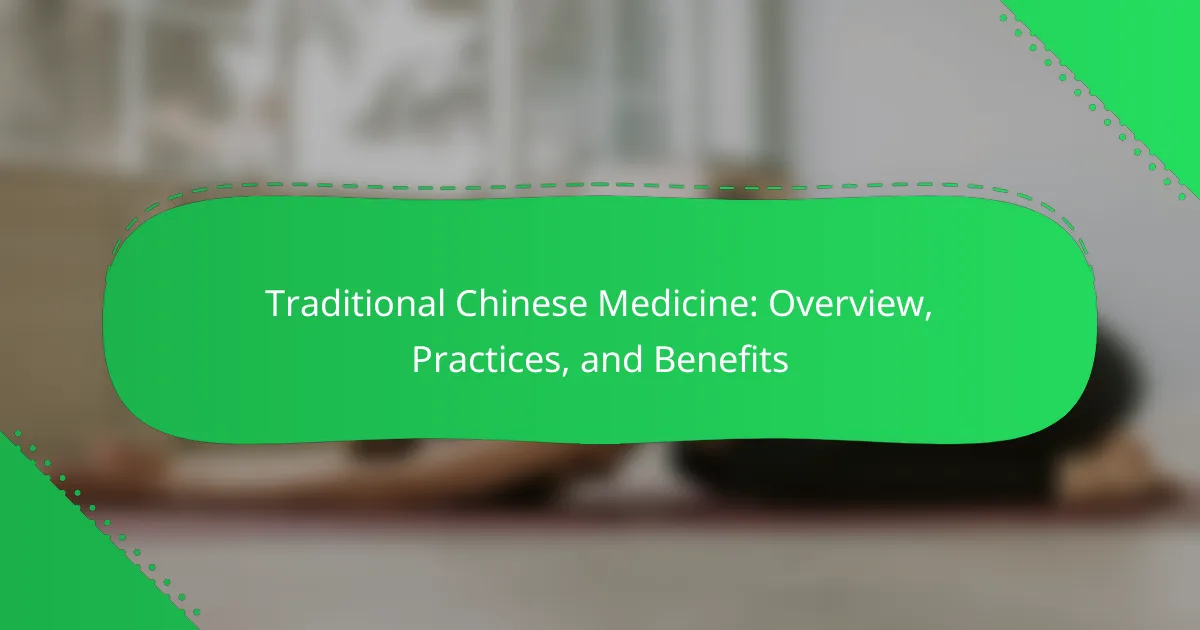Traditional Chinese Medicine (TCM) offers a holistic approach to health, focusing on balance and prevention. It encompasses practices such as acupuncture, herbal medicine, and tai chi. TCM emphasizes the importance of Qi and the interconnectedness of the body’s systems. This article explores the foundational principles, diverse practices, and health benefits associated with TCM, alongside its global perceptions and future trends.
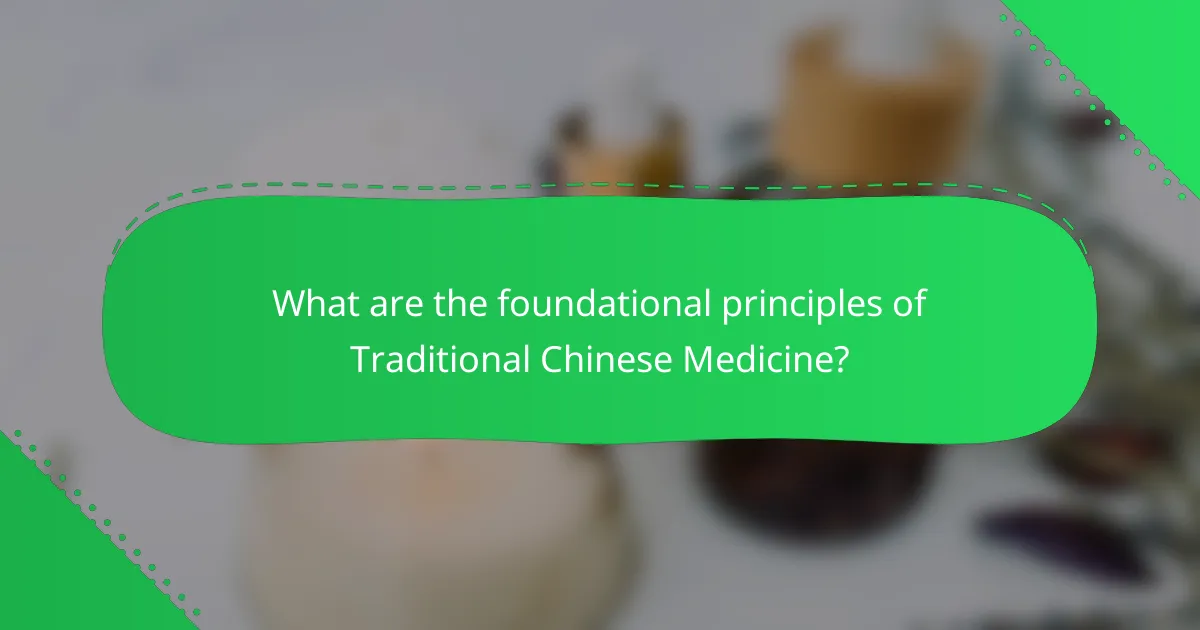
What are the foundational principles of Traditional Chinese Medicine?
Traditional Chinese Medicine (TCM) is based on principles of balance, harmony, and holistic health. Key foundational principles include Yin and Yang, the Five Elements, Qi (vital energy), and the concept of meridians. Yin and Yang represent opposing forces that must be balanced for health. The Five Elements—Wood, Fire, Earth, Metal, Water—explain interactions in nature and the body. Qi flows through meridians, influencing physical and emotional well-being. Understanding these principles guides diagnosis and treatment in TCM, promoting overall health and wellness.
How does Qi influence health and wellness?
Qi significantly influences health and wellness by promoting balance and harmony within the body. In Traditional Chinese Medicine (TCM), Qi is viewed as the vital life force that flows through energy pathways, impacting physical and mental well-being. Imbalances in Qi can lead to health issues, while practices like acupuncture and Tai Chi aim to restore this balance. These methods enhance circulation, reduce stress, and improve overall vitality, showcasing Qi’s essential role in maintaining health.
What role do Yin and Yang play in diagnosis and treatment?
Yin and Yang play a crucial role in diagnosis and treatment within Traditional Chinese Medicine (TCM) by balancing opposing forces in the body. Practitioners assess a patient’s condition through the lens of Yin (representing coolness, rest, and substance) and Yang (representing warmth, activity, and energy). This balance determines treatment approaches, such as acupuncture, herbal remedies, and dietary adjustments, aimed at restoring harmony. For example, a deficiency in Yin may lead to heat-related symptoms, prompting the use of cooling herbs. The dynamic interplay of these forces informs both diagnosis and therapeutic strategies, emphasizing the holistic nature of TCM.
Why is the concept of Five Elements significant in TCM?
The concept of Five Elements is significant in Traditional Chinese Medicine (TCM) as it provides a framework for understanding the interactions between different bodily systems. This model categorizes elements—Wood, Fire, Earth, Metal, and Water—each associated with specific organs and emotions. By analyzing these relationships, practitioners can diagnose imbalances and promote healing. The Five Elements also influence treatment strategies, guiding herbal prescriptions and acupuncture points. This holistic approach underscores the interconnectedness of physical and emotional health, enhancing the effectiveness of TCM practices.
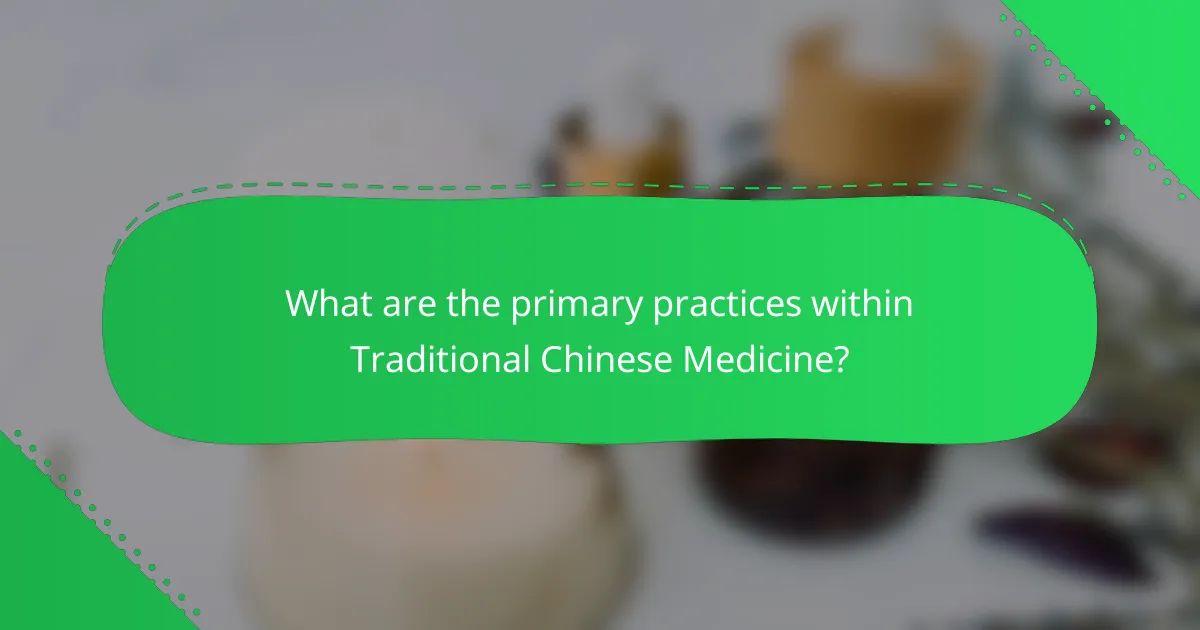
What are the primary practices within Traditional Chinese Medicine?
Traditional Chinese Medicine encompasses practices like acupuncture, herbal medicine, cupping, and tai chi. These techniques aim to balance the body’s energy, or qi, enhancing overall health. Acupuncture involves inserting needles at specific points to relieve pain and promote healing. Herbal medicine uses plant-based formulas tailored to individual needs. Cupping therapy creates suction on the skin, improving circulation and easing muscle tension. Tai chi combines gentle movements and meditation, promoting physical and mental well-being. Each practice offers unique benefits, contributing to a holistic approach to health.
How does acupuncture work and what are its benefits?
Acupuncture stimulates specific points on the body to enhance energy flow and promote healing. Its benefits include pain relief, reduced stress, improved sleep quality, and enhanced overall well-being. Studies show that acupuncture can effectively treat conditions like chronic pain, migraines, and anxiety. This practice, rooted in Traditional Chinese Medicine, balances the body’s energy, known as Qi, fostering a holistic approach to health.
What is the significance of herbal medicine in TCM?
Herbal medicine is a cornerstone of Traditional Chinese Medicine (TCM), emphasizing holistic healing. It utilizes various plants to restore balance, enhance vitality, and treat ailments. Herbal formulas often combine multiple ingredients, maximizing therapeutic effects and addressing root causes of health issues. This practice reflects TCM’s unique attribute of individualized treatment, adapting remedies to each person’s constitution and condition. The significance of herbal medicine lies in its ability to promote wellness and prevent disease through natural means.
How does cupping therapy contribute to recovery?
Cupping therapy aids recovery by enhancing blood circulation, reducing muscle tension, and promoting relaxation. This traditional Chinese medicine practice creates suction on the skin, which can alleviate pain and inflammation. Research indicates that cupping can improve athletic performance and expedite healing processes. The unique attribute of cupping involves its ability to target specific areas, providing localized relief.
What role does Tai Chi play in holistic health?
Tai Chi significantly enhances holistic health by promoting physical, mental, and emotional well-being. This practice integrates movement, breath control, and meditation, fostering balance and relaxation. Studies show that regular Tai Chi practice can reduce stress, improve flexibility, and enhance cardiovascular health. Additionally, it supports mental clarity and emotional resilience, making it a valuable component of traditional Chinese medicine. The unique attribute of Tai Chi lies in its gentle yet effective approach, appealing to individuals of all ages and fitness levels.
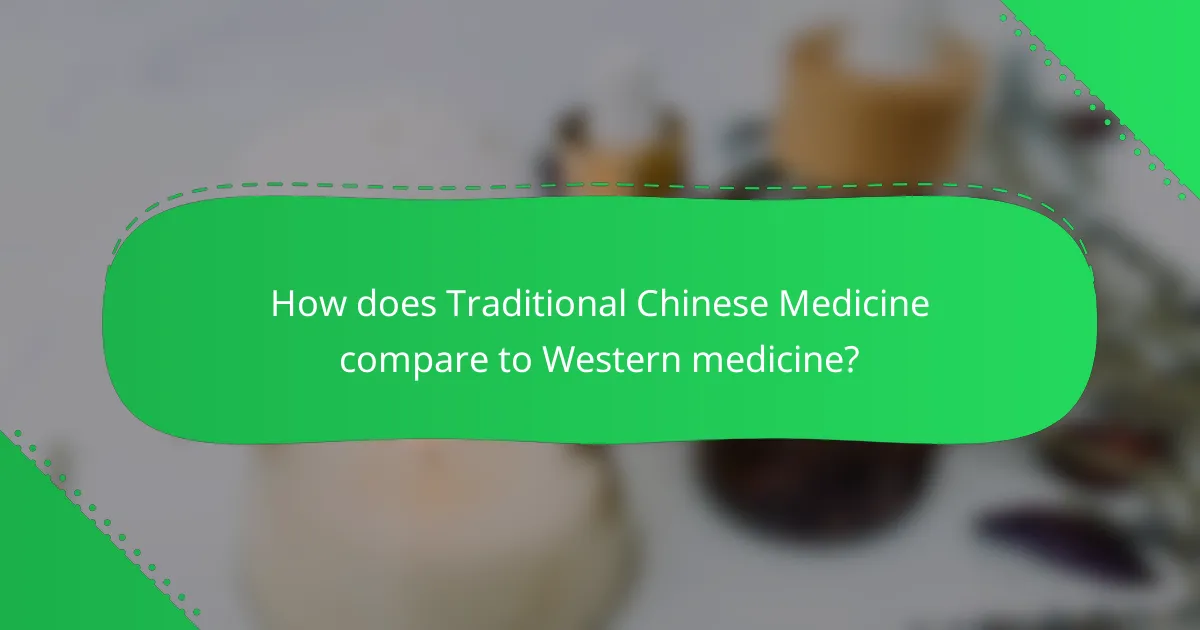
How does Traditional Chinese Medicine compare to Western medicine?
Traditional Chinese Medicine (TCM) emphasizes holistic health and prevention, while Western medicine focuses on diagnosis and treatment of specific conditions. TCM utilizes practices like acupuncture and herbal remedies, aiming to balance the body’s energy, known as Qi. In contrast, Western medicine relies on scientific methods and pharmaceutical interventions to address symptoms and diseases. TCM benefits include improved well-being and reduced side effects, whereas Western medicine often provides rapid results for acute conditions. Each system has unique attributes, with TCM’s holistic approach and Western medicine’s evidence-based practices catering to different health needs.
What are the key differences in approach to illness?
Traditional Chinese Medicine (TCM) approaches illness holistically, focusing on balance and harmony. In contrast, Western medicine typically emphasizes symptom treatment and diagnosis. TCM views illness as a disruption in energy flow, whereas Western practices often rely on biochemical explanations. TCM incorporates methods like acupuncture and herbal remedies, while Western medicine utilizes pharmaceuticals and surgical interventions. This fundamental difference highlights TCM’s unique attribute of integrating lifestyle and emotional factors in healing, which is less prevalent in Western approaches.
How do treatment outcomes differ between TCM and conventional methods?
Treatment outcomes differ significantly between Traditional Chinese Medicine (TCM) and conventional methods. TCM focuses on holistic approaches, emphasizing balance and energy flow, while conventional methods prioritize symptom management and evidence-based treatments.
TCM often utilizes herbal remedies, acupuncture, and dietary changes, aiming for long-term health improvements. In contrast, conventional methods may rely on pharmaceuticals and surgery, targeting immediate symptom relief. Research indicates that patients employing TCM can experience fewer side effects and improved quality of life, although results may vary based on individual conditions.
A study comparing chronic pain management found that TCM patients reported higher satisfaction and reduced pain levels over time. This highlights the unique attribute of TCM’s patient-centered approach, fostering a deeper connection to overall wellness.

What are the specific health benefits associated with Traditional Chinese Medicine?
Traditional Chinese Medicine offers various health benefits, including improved digestion, enhanced immunity, and reduced stress levels. It employs practices such as acupuncture, herbal medicine, and tai chi to promote overall wellness.
Acupuncture can relieve pain and improve circulation, while herbal remedies address specific health issues like inflammation and anxiety. Tai chi enhances balance and flexibility, contributing to mental clarity and physical strength.
Research indicates that these practices can lead to better sleep quality and improved emotional health, supporting holistic well-being. Integrating Traditional Chinese Medicine into daily life may provide a natural approach to maintaining health.
How can TCM help manage chronic pain?
Traditional Chinese Medicine (TCM) can effectively manage chronic pain through various practices. Acupuncture, herbal remedies, and Qi Gong promote pain relief and enhance overall well-being. Acupuncture stimulates specific points, releasing endorphins that reduce pain perception. Herbal treatments often include anti-inflammatory properties, aiding in pain management. Qi Gong combines movement and meditation, improving circulation and reducing stress, which can alleviate chronic pain symptoms. TCM emphasizes a holistic approach, addressing both physical and emotional aspects of pain, making it a valuable option for those suffering from chronic conditions.
What are the mental health benefits of TCM practices?
Traditional Chinese Medicine (TCM) practices offer significant mental health benefits, including stress reduction, improved mood, and enhanced emotional balance. Techniques such as acupuncture and herbal remedies stimulate the body’s natural healing processes. Research indicates that TCM can alleviate anxiety and depression symptoms, promoting overall mental well-being. Additionally, mindfulness practices within TCM, like Tai Chi, improve focus and mental clarity, fostering a sense of calm. These holistic approaches address both physical and emotional aspects, enhancing resilience and coping strategies.
How does TCM support digestive health?
Traditional Chinese Medicine (TCM) enhances digestive health through holistic practices that restore balance. TCM emphasizes the importance of Qi, or vital energy, in digestion. Acupuncture and herbal remedies stimulate digestive function and alleviate symptoms like bloating and indigestion. Specific herbs, such as ginger and licorice, are known for their unique attributes that promote digestion and reduce inflammation. Additionally, dietary recommendations in TCM focus on warm, easily digestible foods, which support optimal digestive processes.
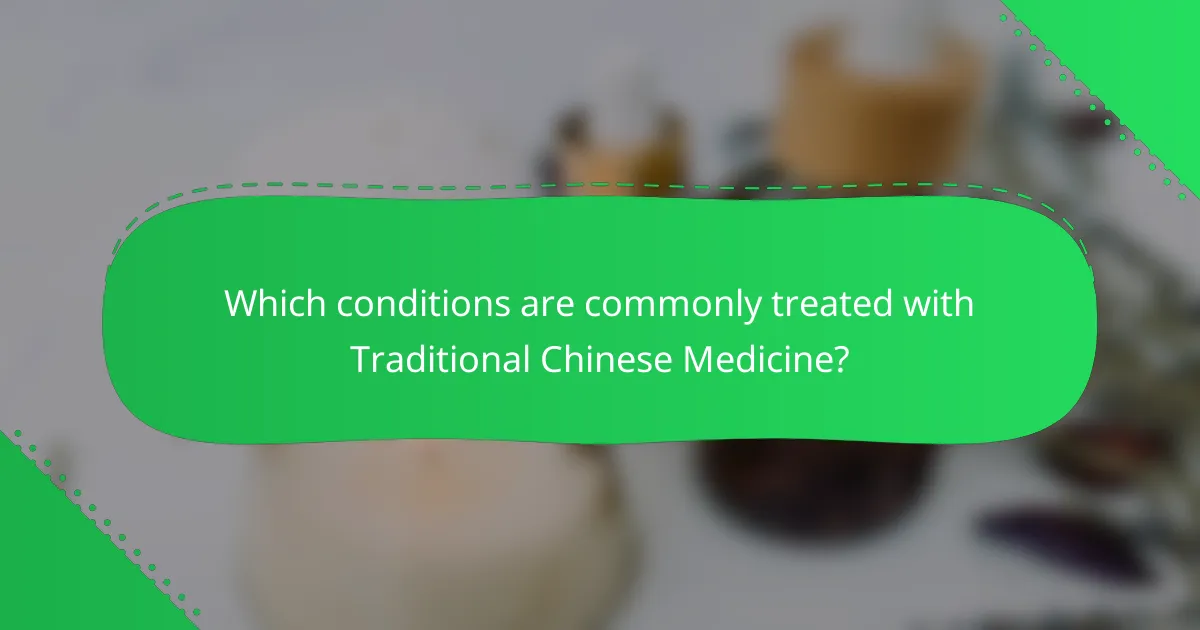
Which conditions are commonly treated with Traditional Chinese Medicine?
Traditional Chinese Medicine commonly treats conditions such as chronic pain, digestive disorders, respiratory issues, and mental health concerns. It employs techniques like acupuncture, herbal remedies, and dietary therapy to address these ailments. For example, acupuncture is often used for pain relief and stress management. The holistic approach of Traditional Chinese Medicine emphasizes balance and harmony within the body.
What are the most effective TCM treatments for respiratory issues?
Traditional Chinese Medicine (TCM) offers various effective treatments for respiratory issues. Acupuncture, herbal remedies, and dietary therapy are commonly used methods.
Acupuncture targets specific points to enhance lung function and reduce inflammation. Studies show it can alleviate symptoms of asthma and bronchitis. Herbal remedies, such as licorice root and ginseng, strengthen the immune system and improve respiratory health. Dietary therapy emphasizes foods that promote lung health, like pears and walnuts.
Incorporating these TCM practices can lead to significant improvements in respiratory conditions. Patients often report enhanced breathing and reduced reliance on conventional medications.
How does TCM approach women’s health and hormonal balance?
Traditional Chinese Medicine (TCM) addresses women’s health and hormonal balance through holistic practices that restore harmony in the body. TCM emphasizes the balance of Yin and Yang, which is crucial for regulating hormonal functions.
Herbal remedies play a significant role in TCM, targeting specific hormonal imbalances. For instance, herbs like Dong Quai are often used to alleviate menstrual discomfort and support overall reproductive health. Acupuncture is another practice that helps to stimulate energy flow and improve hormonal regulation.
TCM also focuses on lifestyle adjustments, including diet and stress management, to enhance women’s health. By promoting a balanced diet rich in whole foods and managing stress through mindfulness techniques, TCM fosters a supportive environment for hormonal balance.
In summary, TCM’s approach to women’s health is multifaceted, combining herbal medicine, acupuncture, and lifestyle changes to achieve hormonal equilibrium and overall well-being.
What are the TCM strategies for boosting immunity?
Traditional Chinese Medicine (TCM) employs various strategies to boost immunity, focusing on holistic balance and natural remedies. Key strategies include herbal formulations, acupuncture, dietary adjustments, and lifestyle practices.
Herbal formulations often feature adaptogenic herbs like astragalus and ginseng, which enhance energy and resilience. Acupuncture targets specific meridians to stimulate immune function. Dietary adjustments emphasize warm, nourishing foods that strengthen the spleen and enhance digestion. Lifestyle practices such as tai chi and qigong promote stress reduction and overall well-being.
These strategies collectively support the body’s natural defenses, making TCM a valuable approach to enhancing immunity.
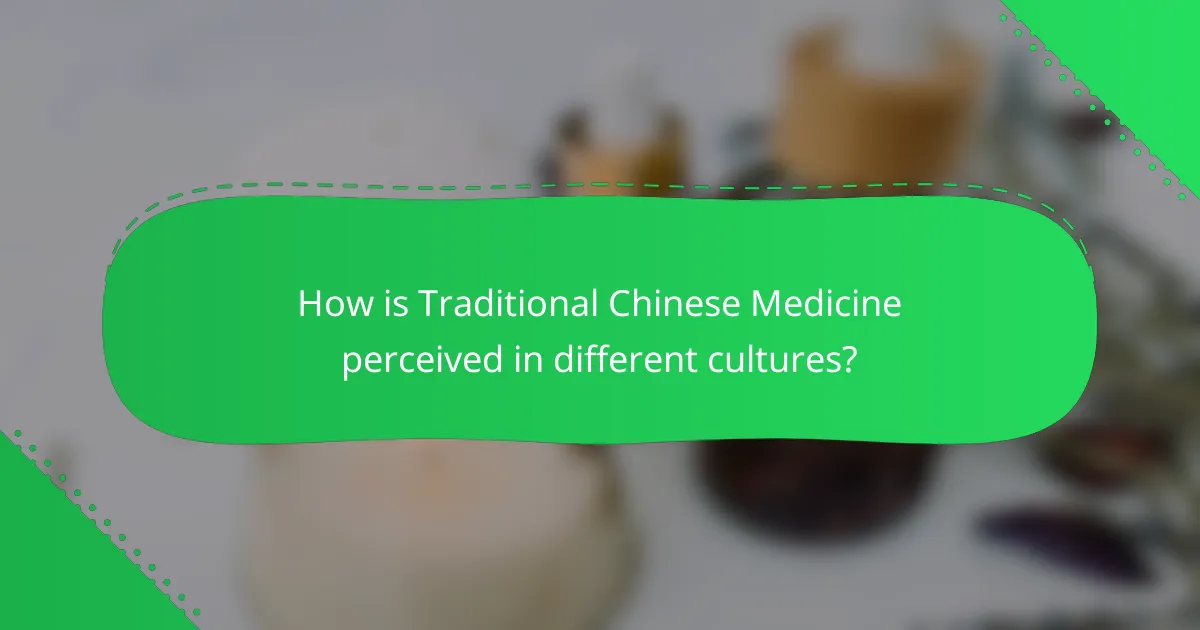
How is Traditional Chinese Medicine perceived in different cultures?
Traditional Chinese Medicine (TCM) is perceived with varying levels of acceptance globally. In Western cultures, it is often viewed as a complementary approach to health, integrating practices like acupuncture and herbal remedies. Many appreciate its holistic focus on balance and wellness, although skepticism exists regarding its scientific basis.
In Eastern cultures, particularly in China, TCM is deeply rooted in tradition and widely accepted as a primary healthcare system. Its principles, such as Qi balance and Yin-Yang theory, are integral to cultural beliefs.
In recent years, TCM has gained popularity in alternative medicine circles worldwide. Its emphasis on natural remedies appeals to those seeking non-pharmaceutical treatments. However, the lack of standardized practices and rigorous clinical trials raises concerns about efficacy in some regions.
Overall, perceptions of TCM reflect a blend of cultural heritage, personal experience, and scientific scrutiny, influencing its integration into global health practices.
What is the acceptance of TCM in Western countries?
The acceptance of Traditional Chinese Medicine (TCM) in Western countries is growing, though it varies by region. Increasing awareness of holistic health approaches and the benefits of TCM practices, such as acupuncture and herbal medicine, contributes to its popularity. Many Western practitioners incorporate TCM into complementary and alternative medicine, enhancing patient care. Research supports some TCM methods, leading to greater acceptance among healthcare professionals and patients alike. However, skepticism remains due to differences in scientific validation and cultural practices.
How do Asian countries integrate TCM with modern healthcare?
Asian countries integrate Traditional Chinese Medicine (TCM) with modern healthcare through collaborative practices and policies. This integration enhances patient care by combining TCM’s holistic approaches with the technological advancements of Western medicine.
In China, TCM is officially recognized and often used alongside conventional treatments. Hospitals may have TCM departments, allowing patients to receive acupuncture or herbal remedies in conjunction with Western therapies. For instance, cancer patients may use TCM to manage symptoms and improve quality of life.
Countries like Singapore and Malaysia adopt similar strategies, promoting TCM through regulatory frameworks that ensure safety and efficacy. These nations emphasize research on TCM to validate its practices and integrate findings into modern healthcare systems.
As a result, this synergy not only preserves cultural heritage but also offers a comprehensive healthcare model that addresses diverse patient needs.
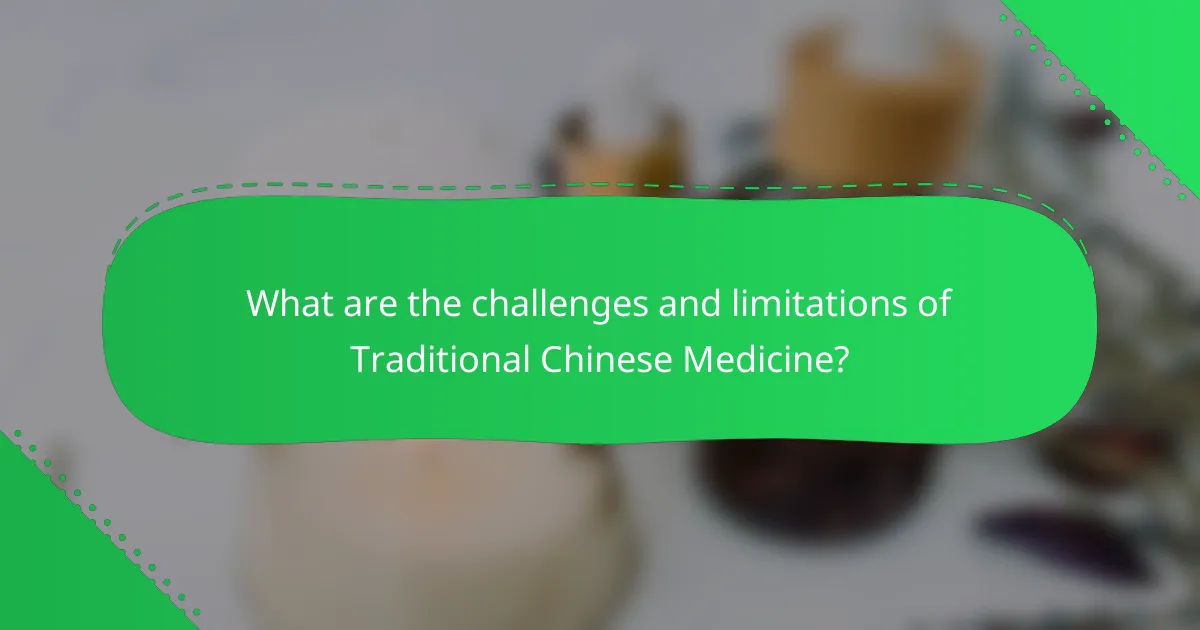
What are the challenges and limitations of Traditional Chinese Medicine?
Traditional Chinese Medicine faces several challenges and limitations. These include a lack of standardized practices, which can lead to inconsistent treatment outcomes. Additionally, there is limited scientific evidence supporting some traditional methods, which can hinder acceptance in Western medicine. The complexity of diagnosis and treatment can also pose difficulties for practitioners and patients alike. Furthermore, regulatory issues and the need for more rigorous training programs for practitioners can impact the quality of care.
What are the common misconceptions about TCM?
Many misconceptions surround Traditional Chinese Medicine (TCM), often leading to skepticism. One common myth is that TCM lacks scientific backing, whereas research increasingly supports its efficacy. Another misconception is that TCM is solely herbal medicine; it also includes acupuncture, dietary therapy, and Qi Gong. People often believe TCM is only for chronic conditions, but it can also address acute issues effectively. Lastly, some think TCM is a one-size-fits-all approach, while it actually emphasizes personalized treatment based on individual diagnosis and constitution.
How do regulatory issues affect the practice of TCM?
Regulatory issues significantly impact Traditional Chinese Medicine (TCM) practices by influencing accessibility and credibility. Regulations can dictate the legality of certain treatments and herbs, affecting practitioners’ ability to offer services. Compliance with local and international standards ensures safety and quality, but can also create barriers for practitioners. Furthermore, regulations shape public perception and acceptance of TCM, affecting its integration into mainstream healthcare.
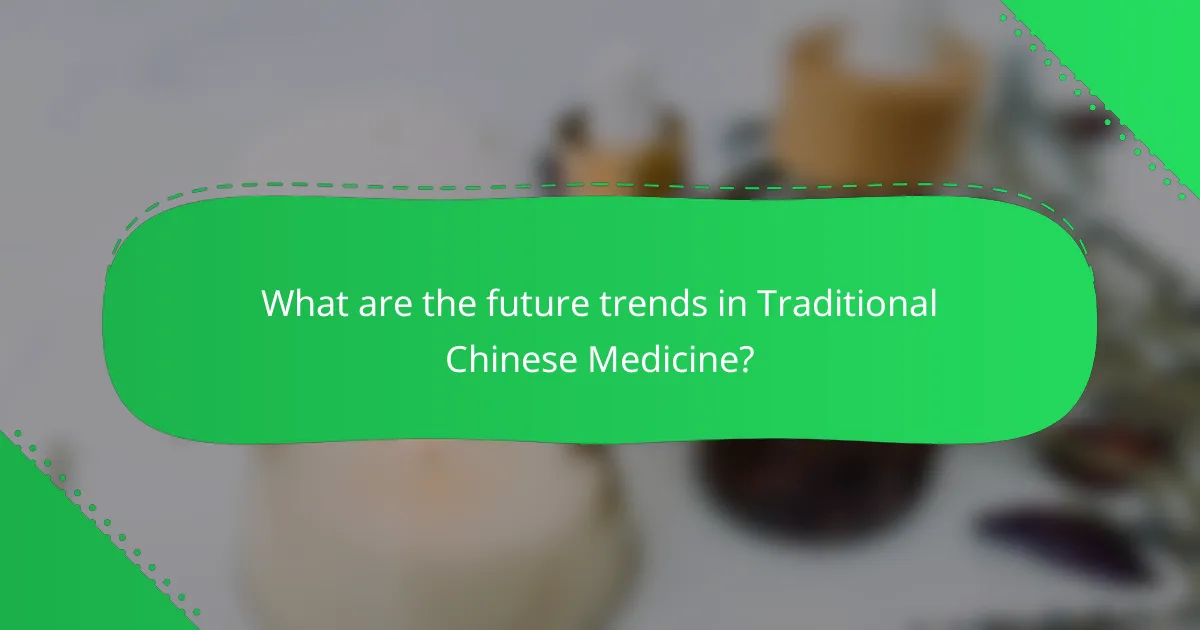
What are the future trends in Traditional Chinese Medicine?
The future trends in Traditional Chinese Medicine (TCM) include increased integration with modern healthcare, a focus on personalized treatments, and the use of technology for diagnosis and therapy. TCM is evolving to meet contemporary health challenges.
1. Integration with Western Medicine: Collaborative approaches will enhance patient care by combining TCM’s holistic practices with evidence-based Western methods.
2. Personalized Medicine: Tailoring treatments based on individual health profiles will become more prevalent, utilizing TCM’s diagnostic methods.
3. Technological Advancements: The adoption of telemedicine and AI in diagnostics will streamline TCM practices, improving accessibility and efficiency.
4. Research and Evidence: Increased scientific studies will validate TCM practices, leading to broader acceptance and application in global healthcare systems.
5. Preventive Health Focus: TCM’s emphasis on prevention will align with growing public interest in wellness and holistic health approaches.
How is technology influencing TCM practices?
Technology is significantly enhancing Traditional Chinese Medicine (TCM) practices. Innovations like telemedicine, AI diagnostics, and health apps improve patient access and treatment personalization. For example, wearable devices track health metrics, allowing practitioners to tailor therapies effectively. Additionally, digital platforms facilitate knowledge sharing among TCM practitioners, fostering collaboration and advancing research. As a result, technology bridges traditional practices with modern healthcare needs, enhancing efficacy and patient engagement.
What role do research and clinical studies play in TCM’s evolution?
Research and clinical studies significantly enhance Traditional Chinese Medicine (TCM) by validating its practices and benefits. They provide empirical evidence that supports efficacy, improving acceptance in modern healthcare. Rigorous studies help identify active compounds in herbal remedies, establishing dosage guidelines and safety profiles. This integration of scientific methods fosters a deeper understanding of TCM’s unique attributes, such as holistic approaches and individualized treatments. As a result, TCM evolves to meet contemporary health challenges while preserving its ancient wisdom.
How can practitioners enhance patient education about TCM?
Practitioners can enhance patient education about Traditional Chinese Medicine (TCM) by employing interactive methods, personalized resources, and clear communication. Utilizing visual aids, such as diagrams, can help illustrate concepts like Qi and meridians.
Offering workshops or seminars allows patients to engage actively with TCM practices, fostering a deeper understanding. Providing tailored educational materials that address individual health concerns can also improve knowledge retention. Encouraging questions and discussions builds trust and clarifies misconceptions about TCM methods and benefits.
Regular follow-ups can reinforce learning and ensure patients feel supported in their journey with TCM.
What best practices should be followed when incorporating TCM into personal health routines?
Incorporating Traditional Chinese Medicine (TCM) into personal health routines requires following key best practices. Start with a consultation with a qualified TCM practitioner to ensure personalized treatment.
Next, integrate TCM practices gradually, such as acupuncture, herbal remedies, or dietary adjustments, to monitor their effects. Consistency is vital; commit to regular sessions or daily practices for optimal benefits.
Additionally, maintain a holistic approach by combining TCM with other wellness strategies, like exercise and mindfulness. Finally, keep a health journal to track progress, noting any changes in well-being or symptoms.
